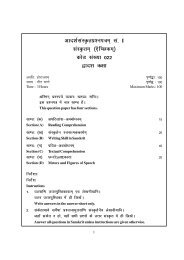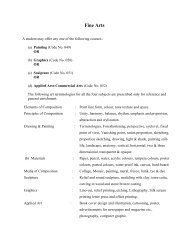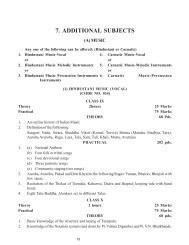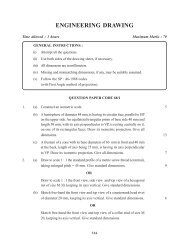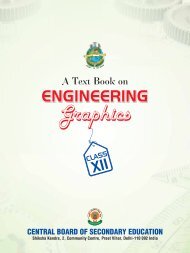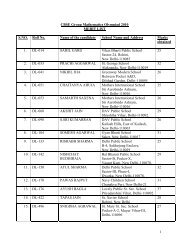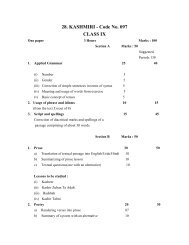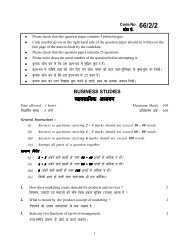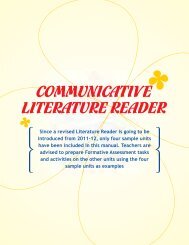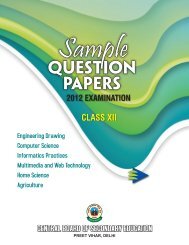sample question papers - Central Board of Secondary Education
sample question papers - Central Board of Secondary Education
sample question papers - Central Board of Secondary Education
You also want an ePaper? Increase the reach of your titles
YUMPU automatically turns print PDFs into web optimized ePapers that Google loves.
ENGLISH CORE<br />
CODE NO. : 301<br />
Class – XII<br />
Sample Question Paper – II<br />
Section A : Reading Max. Marks : 20<br />
1. Read the passage given below and then answer the <strong>question</strong>s which follow : 12 Marks<br />
1. From the moment a baby first opens its eyes, it is learning. Sight and sensation spark <strong>of</strong> a<br />
learning process which will determine in large measure the sort <strong>of</strong> person it will become. Language<br />
stands head and shoulders over all other tools as an instrument <strong>of</strong> learning. It is language that<br />
gives man his lead in intelligence over all other creatures. No other creature can assemble a list<br />
<strong>of</strong> ideas, consider them, draw conclusions and then explain his reasoning. Man can do all this<br />
because he possesses language. And if thought depends on language, clearly the quality <strong>of</strong> an<br />
individual's thought will depend on that person's language-rudimentary or sophisticated, precise<br />
or approximate, stereotyped or original.<br />
2. Very young babies are soothed by human voice uttering comforting words close to them. This<br />
essentially emotional response provides early evidence that feeling is an important component<br />
<strong>of</strong> language learning. Children learn to use language in interaction with other human beings and<br />
this learning proceeds best against a background <strong>of</strong> affectionate feedback from the person who<br />
is closest to them. This is seen to perfection in the interaction between parent and baby : eyes<br />
locked together, the adult almost physically drawing 'verbal' response from the baby, both engulfed<br />
by that unique experience <strong>of</strong> intimate and joyful 'connecting' which sets the pattern <strong>of</strong> relationships<br />
between two people.<br />
3. Thus, long before they can speak, children are involved in a two-way process <strong>of</strong> communication<br />
which is steadily building a foundation on which their later use <strong>of</strong> language will be based.<br />
Constantly surrounded by language, they are unconsciously building structures in their minds<br />
into which their speech and reading will later fit-grammatical constructions, tense sequences<br />
and so on. The forms <strong>of</strong> these structures will depend on the amount and complexity <strong>of</strong> speech<br />
they hear. The fortunate children are those who listen to articulate adults expressing ideas and<br />
defending opinions. They will know, long before they can contribute themselves that relationships<br />
are forged through this process <strong>of</strong> speaking and listening; that warmth and humour have a place<br />
in the process, as have all other human emotions.<br />
4. Using books is the most important means <strong>of</strong> ensuring a child's adequate language development.<br />
None <strong>of</strong> us can endlessly initiate and maintain speech with very small children; we run out <strong>of</strong><br />
ideas or just get plain sick <strong>of</strong> it. Their lives are limited and the experience just isn't there to<br />
provide the raw material for constant verbal interaction, without inevitable boredom on the<br />
child's part and desperation on the adult's...<br />
5. Parents and children who share books share the same frame <strong>of</strong> reference. Incidents in every day<br />
life constantly remind one or the other <strong>of</strong> a situation, a character, an action, from a jointly<br />
enjoyed book, with all the generation <strong>of</strong> warmth and well being that is attendant upon such<br />
sharing. All too <strong>of</strong>ten, there is a breakdown <strong>of</strong> communication between parents and children<br />
when the problems <strong>of</strong> adolescence arise. In most cases this is most acute when the give-and-take<br />
13



